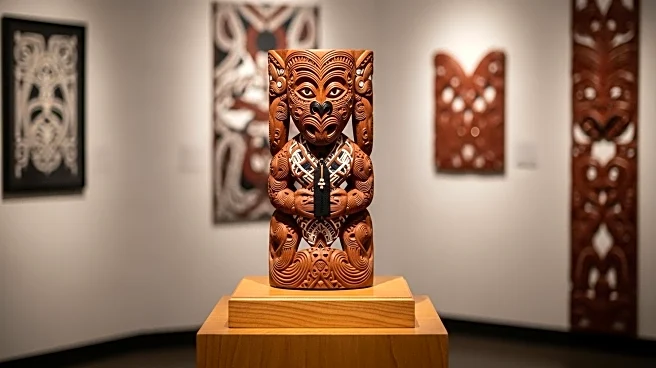What is the story about?
What's Happening?
Mākareti Papakura, a pioneering Māori scholar, has been awarded a posthumous degree from the University of Oxford, nearly 100 years after her death. Papakura was the first indigenous woman to study at Oxford, focusing on the traditions of her Te Arawa people in New Zealand. She passed away in 1930, weeks before submitting her thesis. Her MPhil Anthropology degree was presented to her relative, June Northcroft Grant, at a ceremony attended by over 100 people, including former New Zealand Prime Minister Jacinda Ardern. Papakura's thesis, 'The Old Time Māori,' was published posthumously and is recognized as the first ethnographic study by a Māori author.
Why It's Important?
The awarding of a posthumous degree to Mākareti Papakura highlights the recognition of indigenous contributions to academia, particularly in anthropology. This event underscores the importance of acknowledging historical injustices and the contributions of marginalized communities. Papakura's work continues to inspire Māori scholars and students worldwide, promoting cultural heritage and academic excellence. The recognition by Oxford University serves as a significant step in honoring indigenous knowledge and scholarship, potentially influencing future academic policies and inclusivity efforts.
What's Next?
The recognition of Papakura's work may encourage further exploration and acknowledgment of indigenous scholarship within academic institutions. It could lead to increased support for Māori and other indigenous students pursuing higher education. The event may also inspire similar posthumous recognitions for other scholars who faced barriers due to their ethnicity or gender. Oxford's acknowledgment might prompt other universities to reevaluate their historical treatment of indigenous scholars and consider similar honors.
Beyond the Headlines
Papakura's posthumous recognition raises broader questions about the representation and inclusion of indigenous voices in academia. It highlights the ethical responsibility of institutions to address historical oversights and promote diversity. The event may contribute to ongoing discussions about decolonizing education and integrating indigenous perspectives into academic curricula. It also reflects a growing awareness of the need to preserve and celebrate indigenous cultural heritage within global educational frameworks.















